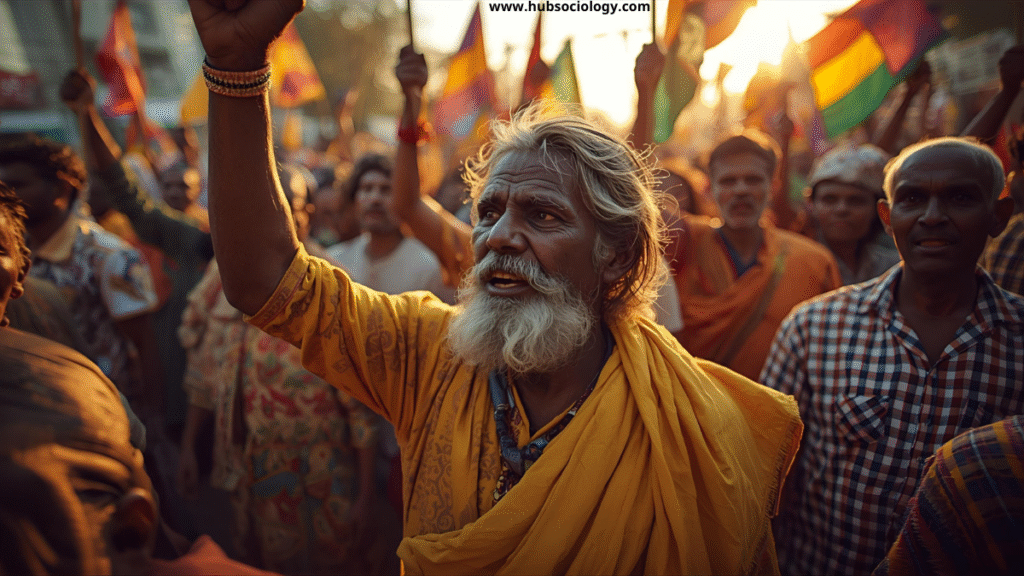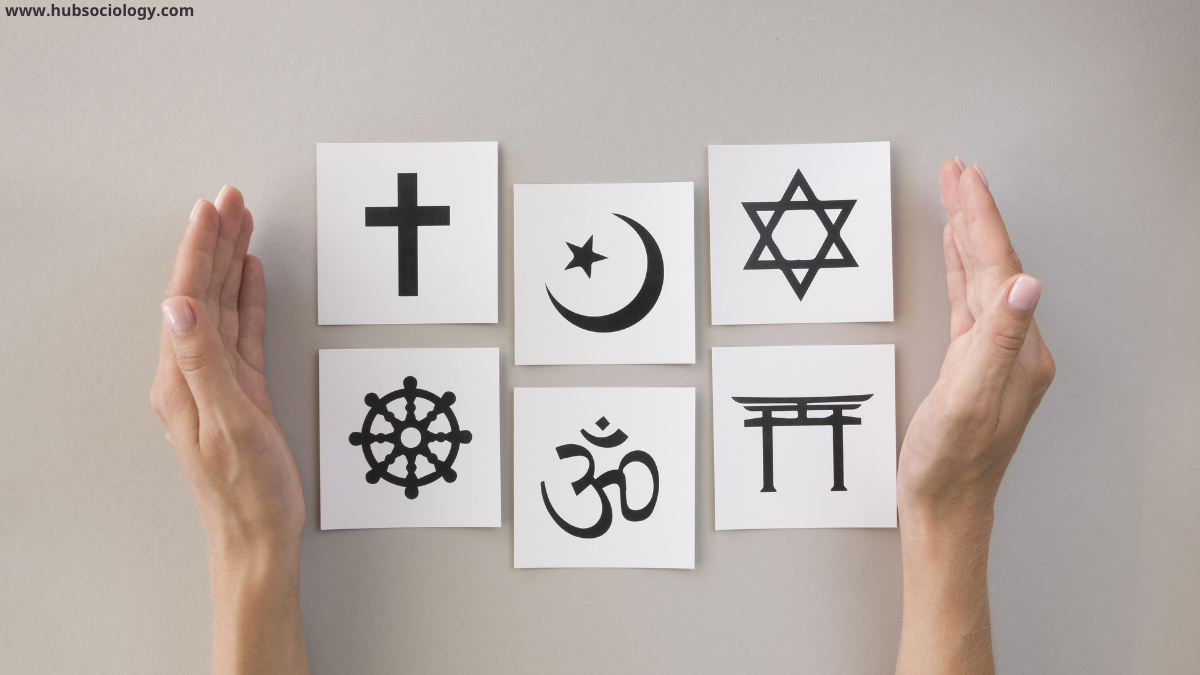Introduction on Secularization and Secularism in Indian Experience
Secularization and secularism are closely related yet distinct concepts that play a vital role in shaping modern societies. Secularization broadly refers to the historical and sociological process through which religion loses its influence over various spheres of life—politics, education, law, and culture. Secularism, in contrast, is a normative principle or doctrine that advocates for the separation of religion from state and public institutions while ensuring equal respect and freedom for all religions.
In the Indian context, the discourse on secularization and secularism holds particular significance. Unlike the Western experience—where secularization is often equated with a decline in religiosity—India presents a unique case where religiosity remains vibrant but is regulated within a framework of constitutional secularism. This duality has been a matter of sociological debate, especially given India’s pluralistic society, diverse cultural traditions, and history of colonialism.
This article explores secularization and secularism in India from a sociological perspective, highlighting their historical evolution, theoretical debates, challenges, and contemporary relevance.

Secularization: Meaning and Sociological Aspect
Secularization, in sociology, is the process by which religious institutions, practices, and values lose social significance. Thinkers such as Max Weber, Émile Durkheim, and Peter Berger emphasized how modernization, industrialization, rationalization, and scientific progress contribute to secularization.
From a sociological angle, secularization in India cannot be understood simply as the decline of religion. Instead, it manifests as a differentiation of religious and secular institutions. For example:
- Education has moved from being controlled by temples, mosques, and churches to state-run schools and universities.
- Politics is guided by constitutional law rather than religious commandments.
- Legal frameworks like the Indian Penal Code function independently of religious doctrines, although personal laws still reflect religious influence.
Thus, secularization in India is partial and contested—it coexists with a deeply religious social fabric.
Secularism: Meaning in Indian Context
Secularism in India differs fundamentally from Western models. The Western model, especially in countries like France, is based on the principle of strict separation between church and state. In India, however, secularism is more about equal respect for all religions (Sarva Dharma Sambhava) and state neutrality in religious affairs.
The Indian Constitution, through its Preamble and Fundamental Rights, enshrines secularism as a guiding principle. The state does not identify itself with any particular religion but also does not prohibit religious expression. Instead, it seeks to maintain harmony among diverse communities.
Thus, Indian secularism is not the absence of religion from public life but the coexistence of multiple religions under a neutral state framework.
Historical Roots on Secularization and Secularism in Indian Experience
Pre-Colonial Traditions
India’s history provides several instances of religious tolerance and pluralism. The teachings of Ashoka, the Bhakti and Sufi movements, and the policies of Akbar’s Din-i Ilahi reflect traditions of coexistence.

Colonial Impact
British colonial rule introduced modern education, rational law, and democratic ideals. At the same time, colonial policies often deepened communal divisions by recognizing separate electorates and encouraging religious identities in politics.
Post-Independence Constitutional Framework
Independent India adopted secularism as a constitutional ideal. The Constitution guarantees:
- Freedom of religion (Article 25)
- Freedom to manage religious institutions (Article 26)
- Prohibition of discrimination on religious grounds (Articles 15 and 16)
- Right to cultural and educational autonomy for minorities (Article 30)
Thus, secularism became central to India’s democratic identity.
Sociological Dimensions on Secularization and Secularism in Indian Experience
1. Pluralism and Diversity
India’s secularism is deeply connected to managing diversity. With Hindus, Muslims, Christians, Sikhs, Buddhists, Jains, and numerous indigenous faiths, the secular state provides an umbrella for peaceful coexistence.
2. Secularization and Social Institutions
- Education: Modern education promotes rationality but religious schools (madrasas, gurukuls, missionary schools) continue to play a significant role.
- Politics: Although secularism is a constitutional mandate, political mobilization around religious identity has been common.
- Law: India retains religious personal laws (Hindu Marriage Act, Muslim Personal Law, etc.), reflecting a limited scope of secularization.
3. Secularism and National Integration
Secularism has functioned as a mechanism to unite India’s diverse population. However, communal riots and religious polarization challenge its effectiveness.
Challenges on Secularization and Secularism in Indian Experience
1. Communalism
The greatest threat to Indian secularism comes from communal politics. Partition in 1947 highlighted the destructive potential of communal division, and episodes of riots (e.g., Gujarat 2002, Delhi 2020) show how religion-based mobilization undermines secular values.
2. Political Manipulation of Religion
Political parties often exploit religious sentiments to gain electoral advantage. This contradicts the constitutional vision of neutrality.
3. Unequal Application of Secular Principles
Critics argue that Indian secularism is inconsistent. For example, the state intervenes in Hindu temple administration but often avoids reforming minority religious institutions.
4. Rise of Religious Nationalism
The rise of Hindu nationalism has generated debates about whether India’s secularism is shifting toward majoritarianism. This has significant sociological implications for minority rights and intergroup relations.

Theoretical Perspectives on Secularization and Secularism in Indian Experience
Max Weber: Rationalization
Weber argued that modern societies move toward rationalization and bureaucratization, reducing religion’s dominance. In India, rational-legal authority has grown, but religion remains central to identity.
Émile Durkheim: Religion and Social Solidarity
Durkheim saw religion as a source of social cohesion. Indian secularism reflects this by attempting to integrate multiple faiths into a common civic order.
Peter Berger: De-secularization
Berger later revised his secularization thesis, arguing that religion remains powerful in modern societies. India exemplifies this—modernization has not diminished religiosity but has transformed its role.
Contemporary Relevance on Secularization and Secularism in Indian Experience
Secularism in India today faces complex challenges. Globalization, social media, and identity politics have intensified religious expressions in the public sphere. Simultaneously, judicial interventions—such as the Supreme Court’s rulings on triple talaq and temple entry—illustrate the evolving nature of Indian secularism.
From a sociological standpoint, secularism remains essential for:
- Protecting minority rights
- Ensuring democratic stability
- Preventing majoritarian domination
- Promoting social harmony in a multi-faith society
Conclusion on Secularization and Secularism in Indian Experience
The Indian experience of secularization and secularism is distinctive. Unlike the Western model of secularization, religion in India continues to play a vibrant role in everyday life, politics, and identity. Yet, the state upholds secularism as a constitutional commitment to pluralism and equality.
From a sociological perspective, secularism in India is both an ideology and a practice—one that constantly negotiates between tradition and modernity, community and individual rights, religion and rationality. Its future depends on maintaining a delicate balance: respecting religious diversity while strengthening democratic and egalitarian values.
In a society as plural and dynamic as India, secularism is not merely a doctrine but a necessity for survival and progress.
Do you like this this Article ? You Can follow as on :-
Facebook – https://www.facebook.com/hubsociology
Whatsapp Channel – https://whatsapp.com/channel/0029Vb6D8vGKWEKpJpu5QP0O
Gmail – hubsociology@gmail.com
Exam-style questions on Secularization and Secularism in Indian Experience
Short Answer Type Questions on Secularization and Secularism in Indian Experience (SAQs)
- Define secularization in sociological terms.
- What is the difference between secularization and secularism?
- Mention two features of Indian secularism.
- Which Article of the Indian Constitution guarantees freedom of religion?
- Give two examples of pre-colonial traditions of religious tolerance in India.
- What role did British colonialism play in shaping secularism in India?
- Explain the concept of Sarva Dharma Sambhava.
- Mention two challenges of secularism in contemporary India.
- What does Weber’s theory of rationalization suggest about secularization?
- Write one difference between Indian and Western secularism.
Long Answer Type Questions on Secularization and Secularism in Indian Experience (LAQs)
- Discuss the sociological meaning of secularization and its manifestations in Indian society.
- Examine the constitutional provisions of secularism in India.
- Analyze the historical roots of secularism in India with reference to pre-colonial, colonial, and post-colonial developments.
- How does secularism function as a mechanism of national integration in India?
- Critically evaluate the challenges of secularism in contemporary Indian politics.
- Compare and contrast the Western and Indian models of secularism from a sociological perspective.
- Explain the role of education, politics, and law in the process of secularization in India.
- Discuss the sociological perspectives of Durkheim, Weber, and Berger in understanding secularization in India.
- How has religious nationalism impacted the secular fabric of Indian society?
- Assess the future of secularism in India in light of globalization and identity politics.
